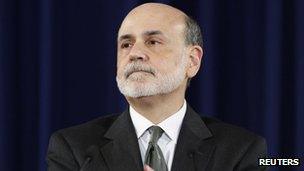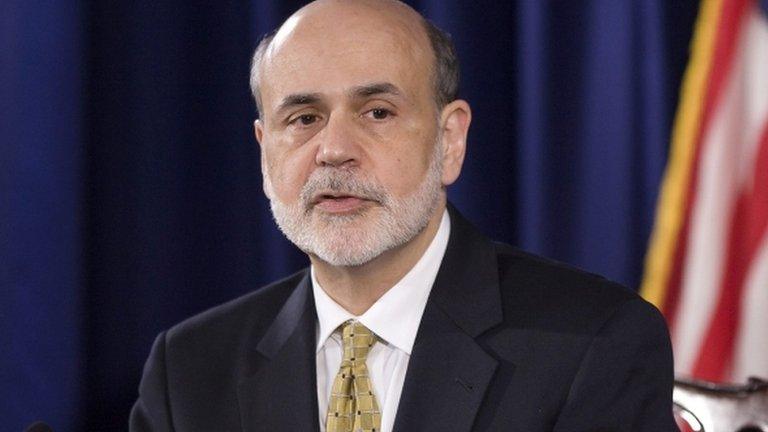Quantitative easing hits the presidential race
- Published
- comments

US conservatives are not, in general, a fan of Federal Reserve Chairman Ben Bernanke
Twelve and a half million Americans are unemployed, although many think the real figure is much higher.
That is because so many people have simply given up looking for work, and aren't reflected in the official figures.
Despite all the back and forth, ups and downs, for most voters there is one topic that matters more than anything else in this election campaign: jobs.
America's central bank doesn't take a political stance, but "jobs" matters to the Federal Reserve too. It has decided, not for the first time, to take controversial action and to try to help out.
It is unusual among central banks as having "maximum employment" as one of its official policy aims.
And they are worried. Their report says, external they are "concerned that, without further policy accommodation, economic growth might not be strong enough to generate sustained improvement in labour market conditions".
So they have launched QE3, their third round of quantitative easing. It is one of those phrases that baffle most people, and most of those clever enough to understand it are too clever to explain it.
It's basically a modern version of printing money, but instead involves buying assets. This is what the fed plans to do:
"The Committee agreed today to increase policy accommodation by purchasing additional agency mortgage-backed securities at a pace of $40bn (£25bn) per month."
And they plan to go on doing it:
"If the outlook for the labour market does not improve substantially, the Committee will continue its purchases of agency mortgage-backed securities."
The aim is to keep interest rates low and encourage more investment.
Conservatives do not like what is happening. During the primaries, one potential Republican , external suggested what the Fed has been doing is "treason".
The actual candidate, Mitt Romney hasn't gone that far, but has issued this statement:
"The Federal Reserve's announcement of a third round of quantitative easing is further confirmation that President Obama's policies have not worked.
"After four years of stagnant growth, falling incomes, rising costs, and persistently high unemployment, the American economy doesn't need more artificial and ineffective measures. We should be creating wealth, not printing dollars."
It will be interesting to see if Mr Romney takes on the Fed directly, in the coming days, or keeps his fire focused on the president.
- Published13 September 2012
- Published14 September 2012
